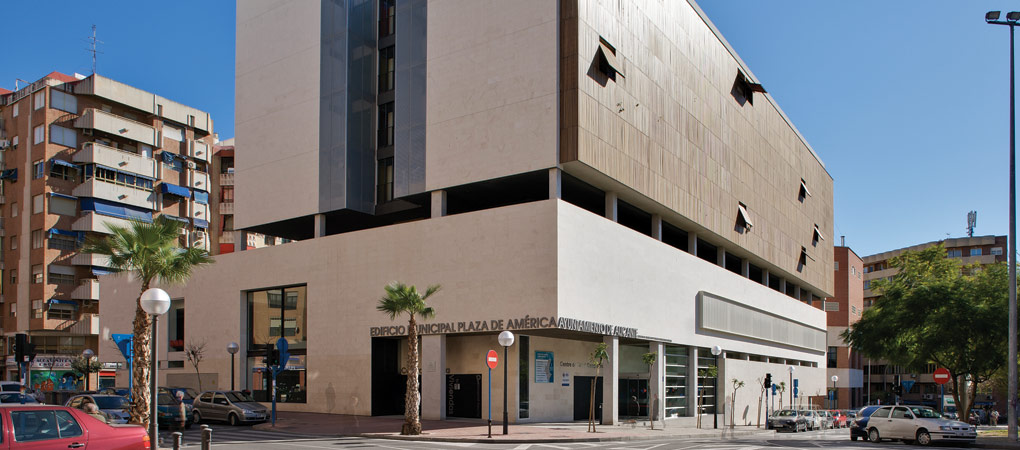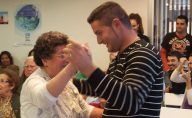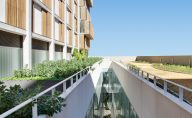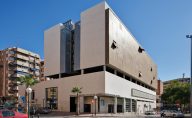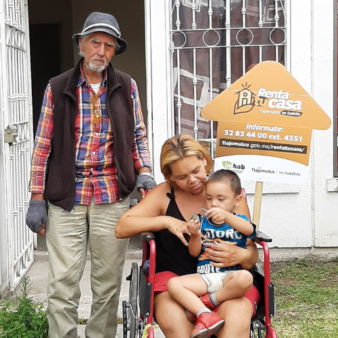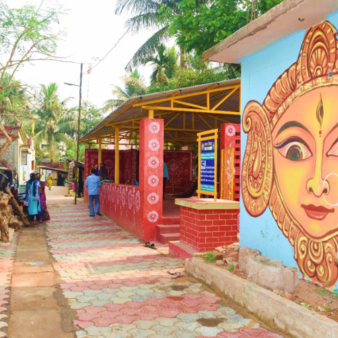Initiated in 2003 by the Municipal Housing Board of Alicante (PMV), the Municipal Project for Intergenerational Housing and Community Services works to address the specific housing needs of low-income older persons and young people through the provision of 244 affordable, intergenerational housing units in central urban areas. The project not only provides decent, accessible housing but also works to create a supportive, family-like environment and sense of belonging among residents, enabling older residents to maintain their independence and stay in their own homes as they age. A range of services is provided to the wider community and the project has contributed towards the regeneration of the surrounding areas.
Project Description
Aims and Objectives
The main objective of the project is to resolve the serious problems faced by many low-income older persons living in inadequate housing conditions and experiencing isolation, loneliness and vulnerability through the provision of affordable housing that allows older persons to live happily and independently. Additionally, the project aims to provide decent housing for low-income young people, contribute towards the revitalisation of the surrounding urban areas and provide a range of services to the community.
Context
The social and demographic changes observed in Spain in recent years have led to particular challenges for older persons, many of whom are currently living in a situation of fragility and vulnerability. In addition to economic difficulties, isolation and solitude, particular housing difficulties commonly faced by older persons in Spain include inadequate housing conditions (e.g. poor maintenance, in the case of controlled rents, or problems with accessibility which, in some cases, prevent them from going out); property ‘mobbing’ (underhanded tactics employed by landlords and property owners to drive low-tenancy occupants from their homes); non-extension of their rental contract; the need to sell their home to supplement their pension incomes; or the loss of their homes as a result of having stood surety for their children who default on their own mortgage payments (an ever more frequent occurrence in the current economic climate). These factors often lead older persons who could otherwise live independently to end up living with their children or entering care homes prematurely.
Key Features
The Patronato Municipal de la Vivienda de Alicante (PMV – Municipal Housing Board of Alicante) works to address the housing problems of the most vulnerable people in Alicante, including the direct provision of rental housing with a focus on marginalised groups. The Municipal Project for Intergenerational Housing and Community Services was initiated in 2003 by the municipality of Alicante, through the PMV and in close cooperation with the Council for Social Action, to address the specific housing needs of older persons. The initiative came about as a result of a previous experience with the construction of a housing complex for older persons in which it was found that despite providing high-quality housing, residents still felt vulnerable and unable to integrate into society. The municipality began to fill any vacancies with young people and the positive results obtained led to the creation of the wider, more ambitious city-wide intergenerational housing project, with a total investment of €50 million.
The project includes the provision of 244 affordable, intergenerational housing units on three different sites in central urban areas which are owned by the municipality and reserved for public use, with the intention of extending to other neighbourhoods in future. Built to high environmental standards, the apartments are complemented by spaces dedicated to communal services (library, computer centre, areas for social events and workshops, solarium, roof garden, laundry) and local health and recreational services for residents. The apartments are 40 m2 on average and can be single or double occupancy (for couples). These are rented as social dwellings, at very affordable rents of, on average, €160 per month.
Residents include low-income older persons over the age of 65 (78 per cent of residents) and low-income young people under the age of 35 (22 per cent of residents). In the selection process, priority is given to those more advanced in age and with the greatest socio-economic disadvantage. Young people are selected based on income as well as motivation, empathy and suitability to work in the social programmes, with preference given to those with qualifications and/or experience in community/social work. Young people are involved on a voluntary basis in the communal organisation of everyday life in the buildings and neighbourhood, and in particular in cultural and recreational activities which take place in communal spaces. On the basis of a ‘good neighbour agreement’, each young person is in charge of taking care of four older people in the building, offering a few hours of their time each week to spend with the older residents and acting as a liaison with PMV if ever there is a problem.
In addition to providing accessible housing and a supportive environment, the programme has also contributed towards the regeneration of the wider area and provides facilities that can benefit the wider community, including a health care centre which attends a population of 30,000 people, a public car park and a day centre located on the premises of the project but open to all inhabitants in the area.
The first of the three buildings included in the programme, Plaza de América, with 72 units housing a total of 87 residents, has been occupied since 2008. Construction of the 78-unit Benalúa project will begin in the first half of 2012, with the 94-unit Lonja-Mercado project expected to be built in 2013.
What impact has it had?
- Residents have widely expressed how the project has increased their well-being, allowing them to be independent yet not alone, live in a decent home with a family-like environment and have a wide range of activities within reach.
- Relatives of residents are reassured that their parent/grandparent/relative is able to live independently, in a safe environment.
- In addition to accessing high-quality housing at affordable rental rates, young people report gaining knowledge and establishing real relationships of friendship with the older persons they assist.
- There has been a positive impact on the neighbourhood as a whole, contributing to the renewal of the local area and providing municipal services to residents.
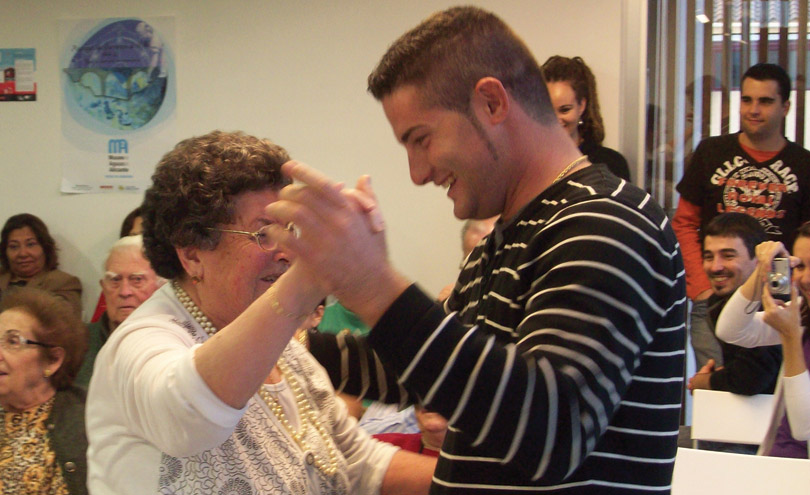
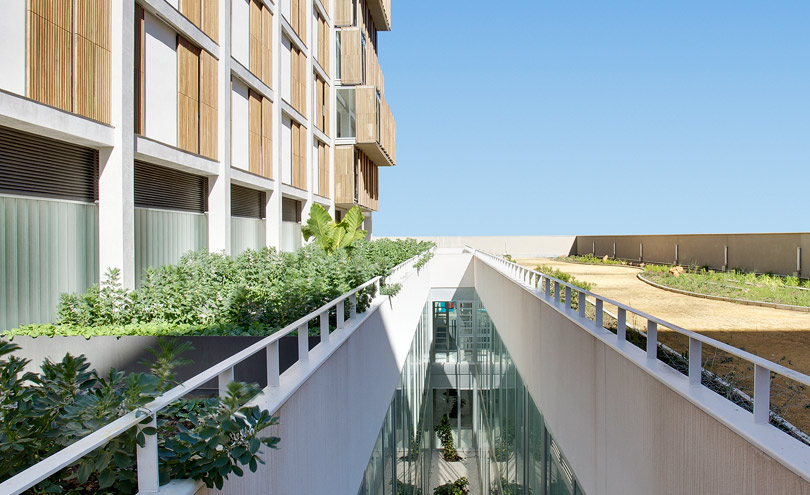
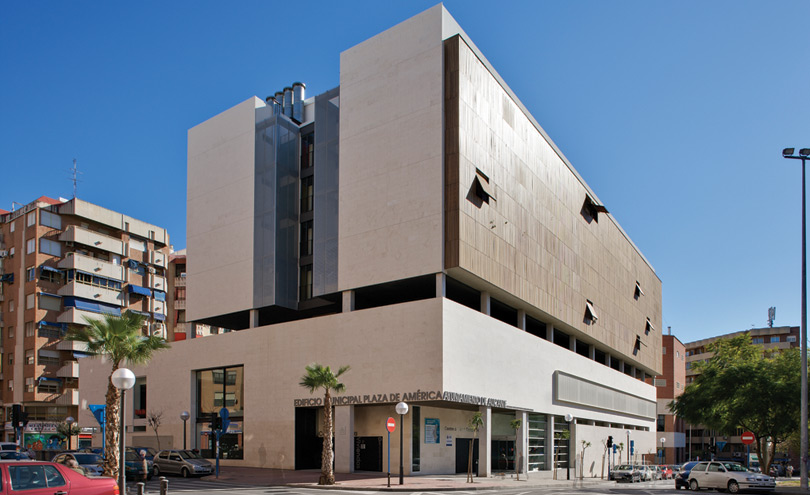
How is it funded?
The total cost for the three buildings is €50 million. The residential properties are entitled to existing funding streams from the Ministry of Housing (as subsidised public rental housing), including grants (20 per cent of costs) and mortgage loans with very low interest rates (80 per cent of costs, at current interest rates of 2.54 per cent) as well as grants from the Autonomous Government of Valencia.
The Autonomous Government of Valencia, via the Regional Ministry of the Environment, Water, Planning and Housing, has provided a complementary grant of €995,000 for the funding of the Day Centres in the properties. Funding has also been obtained from the Council of Alicante and private sector contracts, with the land donated by the municipality.
PMV is responsible for the running costs of the residential properties, including the mortgage repayments, building maintenance costs and management costs for the social programme. These are covered entirely by the rents received. The running costs of the community services are covered by the individual service providers/managers, i.e. Regional Ministry of Health and the private operator of the car park.
Why is it innovative?
- The intergenerational nature of the occupation of the properties allows, whilst guaranteeing the independence of each user (the building is shared, not the homes), a generational diversity that helps the functioning of community life.
- Other innovations include the self-managed activities to promote social integration and the creation of a ‘big family’ environment, which has been even more highly valued by residents than the accommodation itself.
- Funding has been obtained from a range of governmental sources and the private sector, ensuring flexibility.
- The project promotes the use of public land that has traditionally exclusively been used to establish single public services, with a great loss of buildable area, economies of scale and the synergies provided by combining public services and housing.
What is the environmental impact?
The project uses locally-sourced materials where possible (e.g. limestone from local quarries), as well as recycled materials. It is built on a brownfield site and the timber used in the façades is from sustainable sources.
Special care has been taken to design the properties in such a way as to ensure natural cross-ventilation throughout the interiors. Likewise the façades have been designed to ensure appropriate shading and cooling. Solar panels provide hot water and roof gardens provide added insulation.
Is it financially sustainable?
The income received from the rents is sufficient to cover the mortgage loan repayments, including interest, and have generated an annual surplus of €30,499. PMV as a whole has achieved an acceptable level of self-funding and economic viability, financing 82 per cent of its annual budget of €7 million via its own revenues (via the rents collected from all projects, including the intergenerational housing), with just 18 per cent funded via the budgetary provision of the Council of Alicante.
The project focuses on ensuring housing affordability and accessibility, enabling access to decent housing for both young people and older persons on low incomes (up to €21,000 and not owning any other residential property). It provides rental housing at very affordable rates, i.e. approximately €160/month for a 40 m2 property plus a €40 service charge, which represents 35 per cent less than the maximum permitted by the Housing Plan for properties of this type and 50 per cent less than the lowest offered by the private market in the area. A mediation service provides support for tenants facing any difficulties in making their rental payments, ensuring that they can remain in their homes.
What is the social impact?
The project’s social programme has been conceived to empower older persons to become active agents in their own lives rather than passive recipients of services. Residents are involved in planning, developing and implementing programmes and activities, taking the lead in different committees and playing an active role in governance (residents’ association and wider networks).
In addition to creating communal facilities, various activities have been developed to encourage integration among residents. Four intergenerational committees have been created for the self-management of the programme and activities: (1) ‘Back to Earth’ project: landscaping and vegetable gardening; (2) ‘From Culture to Information’ project: library, ‘life stories’ writing workshop, video production, DVD cinema sessions, music and dance workshops; (3) ‘Fiesta’ project: community gatherings and celebrations; (4) ‘Technology in your Hand’ project: computer workshops and support in using the internet, mobile phones, heating and air conditioning equipment, etc. PMV’s Social Department provides training to older residents (e.g. cookery and home economics) as well as the young monitors (e.g. first aid, small repairs, handling of domestic appliances, safety in the home).
The project seeks to improve the well-being of residents and has been designed to ensure full accessibility for older persons, with flexible internal compartmentalisation so that the accommodation can be adapted to their changing needs. Older residents report that they feel very safe in their homes, knowing there is always someone there to help in case of need. 24-hour emergency assistance is provided, enabling residents to live independently.
The project focuses on the social inclusion of older persons and reduction of vulnerability and isolation, and encourages integration between residents and the wider community through various services open to the public. All young people help the older residents with a range of daily activities that were formerly habitual in communities of neighbours and which are being lost over time, making life for people with any kind of difficulty much more complicated.
Barriers
- One of the main errors committed in the initial approach was to give the older residents too much of a passive role in the activities and in the responsibilities of community life. This has since been resolved, with the older residents themselves showing PMV that they are in a condition to take on a leading role in the collective activities and responsibilities.
- During the construction of ‘Plaza de América’, it was a challenge to make the payments for the work coincide with the contributions of the different partners, the car park operator and Regional Ministry of Health. The contractor, however, understood that this was an innovative project which was worth being a part of despite the occasional difficulties with the timing of the payments.
- When a resident’s circumstances change and he/she is no longer able to live independently, it is not always easy or immediate to obtain a vacancy in a public care home. To this end, PMV is working to formalise an agreement with the Autonomous Government of Valencia to guarantee immediate vacancies for residents in public care homes having shown that, thanks to the service PMV provides, the age at which residents enter care homes is delayed greatly, reducing costs to government.
Lessons Learned
- The relationship and coexistence between generations is not only possible but is gratifying in both directions.
- The experience has shown that feelings such as loneliness and vulnerability of older persons are the factors that most influence them regarding their quality of life, and that intergenerational housing provides a solution to this problem.
- Part of the success of the project depends on the skills and involvement of the young people, so making the right choice in the selection process is key.
- It is necessary to dedicate a great deal of time to know the requirements, aspirations, fears and skills of the residents before establishing the specific social programmes to be developed.
- It is necessary to give an active role to the older residents in the activities and absolute responsibility to decide what to do at any time, recognising that they are not just elderly people with housing problems but are fully capable of leading their own lives.
Evaluation
Post-occupancy surveys have been carried out with the older residents with excellent results, both in terms of satisfaction with the accommodation and services provided, and in how close it comes to what the residents would consider their ‘ideal’ living situation. A study was carried out with the University of Alicante to assess how well adapted the facilities and accommodation are to the needs of residents, with the conclusions feeding back into future projects. Additionally, the Coordination and Participation committee carries out quarterly assessments of programmes and activities.
Transfer
The project first began with a small 18-unit complex for older persons and has been scaled up, with a 72-unit project built and a further 172 units to be built by 2013 on the Benalúa and Lonja-Mercado sites. The intention is to continue to extend the programme to other neighbourhoods in Alicante in the future.
The programme has received many visitors, including a UN-HABITAT delegation, associations of developers, representatives of national and overseas universities (Toulouse, New York and Tokyo) and representatives of Spanish councils. The project was one of three presented by the City of Alicante within the UN-HABITAT 100 Cities Initiative, which looks at innovative practices around the world.
2012 is the European Year for Active Ageing and Intergenerational Solidarity and the project is being promoted through the Spanish Intergenerational Network, a national government initiative.

